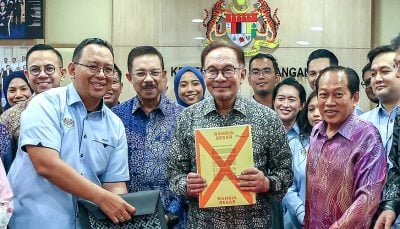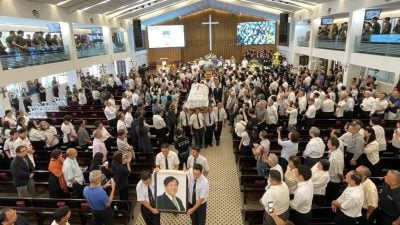
The 2024 Budget to be tabled by the Unity Government next Friday will focus on controlling inflation, stabilizing the ringgit and improving the living quality of the people, in particular those from the B40 and M40 groups. It will also continue to spearhead the development in education as well as the construction in health, flood mitigation and public transportation projects.
Various government departments and the general public have high expectations from the government, hoping to benefit from next year’s Budget. Unfortunately due to the straitened fiscal position, the prime minister might be helpless in delivering goodies to the rakyat this time.
PM Anwar Ibrahim asserted recently in Ipoh that the government would not continue to expand the public debt level already at a staggering RM1.5 trillion, and that the government of the day needs to bear the immense debt accumulated over the years by previous administrations. Anwar also said it is now time to shoulder the responsibility so that the debt will not be inherited by our children.
Prior to that, the country has recorded a budgetary deficit up to 5.6% of GDP. If all the government does is to please the public, it can always keep borrowing to subsidize each and every Malaysian. Anyway, majority of Malaysians will not see nor understand the crisis arising from worsening budgetary deficit, because all the problems will only surface ten years down the road. But, this is not what a responsible government should do.
Let’s run some estimates. If the government only services the annual loan interest and not the principal, and the annual budgetary deficits remain at 5.6%, the country’s public debt will double to RM3 trillion in 13 years’ time. Based on the country’s expected population 13 years later, each Malaysian will have a share of at least RM80,000 of the debt.
As such, the prime minister said the debt situation can only improve if no new debts are added while budgetary deficits are progressively reduced in coming years.
On Feb. 21 this year, Anwar tabled the 2023 Budget (replacing the one by the previous administration) in Dewan Rakyat. This “Malaysia Madani” budget totaled RM388.1 billion, or 20.4% of the country’s GDP, with a deficit at 5%. Of this total, RM99 billion (25.5%) has been set aside for development expenditure and RM289.1 billion (74.5%) for administrative expenditure. This “Malaysia Madani” budget is RM15.8 billion or 4.2% over Ismail Sabri’s “Keluarga Malaysia” budget.
Based on the 20.4% of GDP as a point of reference, with an estimated GDP growth of 3.9% this year, next Friday’s 2024 Budget should be around RM403 billion.
So far the bulk of the annual budgets has failed to go to where it is most needed (development) because of the unrealistically high administrative expenses, which include remunerations of civil servants and servicing of loan interest. The thing is, if this problem is not addressed, there is no way we can remarkably trim the annual budgetary deficits.
The government needs to exercise a lot of prudence in drawing the 2024 Budget, given the country’s straitened fiscal position.
In view of this, the PM must be resolved to address the issue of our excessively bloated civil service. Rising administrative expenses will only eat into allocations supposed to be for development, and this is not going to be a very healthy sign.
The annual budgets have sought to strike a balance between expenditure and revenue. Government revenue is mainly derived from all kinds of taxes, including import and export duties, corporate and individual income taxes, value added, sales, consumption and inheritance taxes, as well as stamp duties, among others.
Last year, the government’s tax revenue was only 11.7% of GDP. Higher tax rates will impact investor sentiment and high-income individuals. If we are unable to boost tax revenue, then we will need to cut expenditure or allow the deficit to run higher.
To expand the revenue base, the government must boost existing and new investments to create more wealth and promote economic development so that more taxes can be collected.
And to cut expenses, excessive subsidies for B40 and M40 communities can only be slashed if their incomes improve. It is imperative that the government systematically review all existing subsidies and allowances and cut back on unnecessary expenses. The existing civil service hiring policy must be re-examined while white elephant projects not benefiting the rakyat or nation must be halted.
Nonetheless, developments that will benefit the people must proceed, including health and medical services, education system, flood mitigation projects as well as public transport.
Meanwhile, the government must also strive to contain inflation, promote economic development, stabilize the local currency, increase Malaysians’ incomes, continue to provide assistance to low-income and underprivileged communities, subsidize essential items, and stabilize goods supply and prices.
The 2024 Budget will mark the second year of the Anwar administration, and we believe with the time given to him, the prime minister will be able to deliver a more inclusive administration and more sustained development for the nation, while instituting civil service and political reforms, and narrowing the wealth and urban-rural gaps to eventually restore public confidence towards the government.
ADVERTISEMENT
ADVERTISEMENT








































